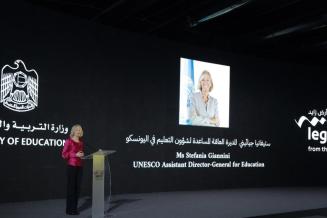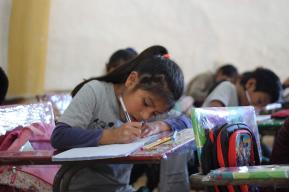News
UNESCO at COP28: Making education the long-term solution to the climate crisis

UNESCO is accelerating climate change education and greening initiatives through its coordinating role of the Greening Education Partnership and extensive work on education for sustainable development (ESD). At COP28, UNESCO showcased its efforts and called for concrete commitments and actions from countries to equip learners and teachers with the knowledge and skills to tackle the climate crisis.
The historic focus on education was marked by the introduction of the first-ever education pavilion. Hosted by the UAE Ministry of Education in partnership with UNESCO, the pavilion emphasized education's central role in addressing climate change. UNESCO organized key events, including a high-level ministerial meeting, and a Greening Education Hub that featured over 200 side events.
Major mobilization by countries for climate change education
Most notably were the commitments and actions from partner countries of the Greening Education Partnership, a global initiative with a mission to get every learner climate-ready. A significant milestone was the signing of the Declaration on Education and Climate Change by 39 countries. The endorsement of the declaration, which serves as a framework to foster climate-resilient educational systems by focusing on adapting education to climate risks, engaging learners in mitigation efforts, and securing necessary financial support to build climate-resilient education systems is a testament to the urgency of education in the climate crisis. It marked a critical step in garnering country commitments and putting into action the next steps for climate change education at future COPs and beyond.
It’s clear that education has been and remains a victim of climate change. But it is also undeniably an essential part of the solution. We all recognize that the most effective way to halt the further advancement of climate change is to empower teachers and learners with the knowledge, skills, attitudes, and behaviours necessary for impactful action.

Empowering learners and teachers for climate action
There are significant gaps globally in how climate change education and sustainability are taught in classrooms. Getting every learner climate-ready requires a holistic approach that involves adapting curricula, training teachers, rethinking schools and empowering communities. UNESCO is currently developing a Green school quality standard and greening curriculum guidance to mainstream climate education in schools and educational institutions. This is part of its ongoing work on ESD and its role as secretariat to the Greening Education Partnership which has currently rallied 81 countries and over 1,100 organizations. So far, 126 countries have committed to addressing climate change through education. Within the Partnership, 60 out of 81 countries plan to review their curriculum and integrate climate change and biodiversity in the next three years. 70 out of 81 countries plan to provide training to teachers on climate education issues.
We see that education has clearly been a victim of the climate crisis. But we cannot forget that it is also an essential part of the solution.
The impact of climate displacement on the right to education
The growing impacts of climate change and displacement on education can no longer be ignored. 32.6 million people were internally displaced in 2022 due to disasters. The increasing number of people displaced due to climate change faces unique vulnerabilities, especially in terms of access to education. This challenge is not only attributed to the often limited political and legal recognition of these displaced persons, but also stems from the global community’s lack of awareness of the diverse obstacles they encounter in seeking access to education. UNESCO’s new global report on the impact of climate change and displacement on the right to education provides guidance to policy-makers on how to better respect, protect and fulfil the right to education of climate-displaced people. It provides an overview of climate-induced barriers to education, and policy guidance on how to ensure the protection of the right to education of these populations.
How are learners being taught and informed about climate change around the world?
The lack of climate change education hampers global climate action. According to UNESCO’s GEM Report, 62% of countries lack specific national-level laws, policies, and strategies for climate change education. Climate change communication and education is a critical tool to help citizens understand and address the impacts of climate change. It aims to develop understanding, values and behaviours that can advance collective climate action.
The GEM Report has partnered with the Monitoring and Evaluating Climate Communication and Education Project (MECCE) to advance global climate change literacy and action. This project has compiled comprehensive country profiles on national education laws and policies related to climate change communication and education. A new set of 30 country profiles (80 in total) explore greening education approaches across all world regions and income levels, covering 75% of the global population. The profiles respond to the need of improving the evidence base on the implementation of national education policies on climate change communication and education.









